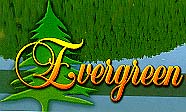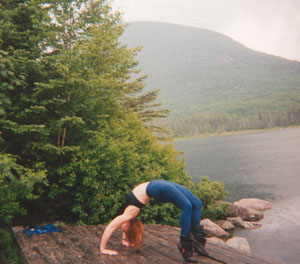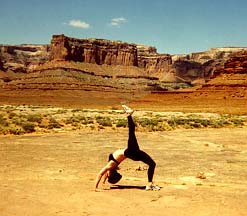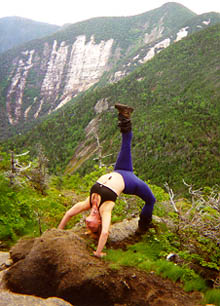Nature in the Literary Imagination
by Professor Julia  Keefer
Keefer
Spring 2014 New York University
LITR1-UC 6251 SESSION 1 SECTION 1 4 Credits McGhee Division
Wednesdays: 6:20 to 8:50 pm
Through selective study of the Bible, the Koran, Shakespeare, the Romantic poets, American transcendentalists, indigenous authors, contemporary eco-writers, and Integral Ecologists, we explore how humans have described and interacted with nature over the years in different parts of the world. How and why does literature imagine nature? This course focuses on the aesthetics of language, the descriptions of nature, and the explicit and implicit claims embedded in the matrix of literary art. We compare poetic with literary non-fiction scientific writing on the environment, as we speculate on what ecoliterature teaches us about our planet now, in the past, and hopefully in the future.
Waverly 429 Wednesday, February 26, 2014 6:20 to 8:50 pm. Email julia.keefer@nyu.edu for questions. Thanks to Barbara Kingsolver for the wonderful Skype session in her lovely studio on her Appalachian farm!
Course Objectives:
1) To improve reading and writing skills, focusing on literary analysis and eco-journalism and/or nature poetry.
2) To improve oral communication through two oral presentations.
3) To learn about the rich tradition of writing about the environment through all perspectives from the religious and dramatic to the poetic, journalistic, and scientific.
4) To discuss the web of intersections between the art of literature
and the science of the environment
5) To host or attend readings with Green authors
Course Requirements:
1)Attendance and participation at weekly on site classes Wednesday evenings are required. This includes a Retrospective for Barbara Kingsolver February 26 in collaboration with Literary Club and Greening Committee and Green field trips in the spring.
2)Bring one short close textual analysis focusing on language to class every week.
3)
Each student will prepare and present two oral presentations on topics of their choice related to course themes.
4) Write in your eco-journal every week. This can include creative writing or eco-journalism depending on your major and interests.
5) Final paper is a synthesis of at least 8 CTs of literary analysis threaded together with entries from your eco-journal and your notes from your oral presentations.
Course Prerequisites: Course is open to all majors from all divisions who have completed the writing sequence.
Required Reading:
Use any edition--cheap, used, Dover, or digital
Flight Behavior, The Poisonwood Bible, Last Stand: America's Virgin Lands, Animal, Vegetable, Miracle, The Lacuna, Holding the Line, The Bean Trees, High Tide in Tucson, Pigs in Heaven, Animal Dreams by Barbara Kingsolver (Each student can pick different books as everyone must prepare something for the retrospective 2/26)
The Tempest by Shakespeare
Romantic Poets Dover edition
Norton Book of Nature Writing
Ecopoetry Anthology: Trinity University Press
Birds, Beasts, and Seas by NP (J.Yang editor)
Surfacing by Margaret Atwood (Then choose your own book for the Atwood retrospective)
Turquoise Ledge and Ceremony by Leslie Marmon Silko
The Spell of the Sensuous by David Abram
The Waves by Virginia Woolf
N.B. Esbjörn-Hargens, S. & Zimmerman, M. E. Integral Ecology: Uniting Multiple Perspectives on the Natural World (Random House/Integral Books, 2008),}(Due to the lack of social science majors, this textbook is optional although we will discuss some of the theories.)
Professor Keefer's selections of poetry and short prose in booklet
Grading: You cannot get an A if you miss more than one class. Attendance and participation are critical in an upper-level class. Weekly writing of quality, the eco-journal, and class discussion affect grade.
Course Breakdown
Short CTs due every week on poems or poetic prose related to themes.
Read Kingsolver books for the first three weeks. 2 oral presentations are due: one for the author retrospective, and one topic of choice at the end of the semester.
January 29: Introduction to Ecoliterature, Nature poetry, and Integral Ecology. Paradigms of perspectives. Read IE textbook, poetry, and essays for next week.
Read Kingsolver.
January 30: Optional reading and signing at NYU's Law School for E.L. Doctorow's Andrew's Brain. 7 pm. Free wine reception. No RSVP.
February 5: Bible and Koran on nature.
Oral presentations on Kingsolver.
February 12: Spell of Sensuous versus Integral Ecology. Oral presentations on Kingsolver list.
February 19: Flight Behavior and/or Poisonwood Bible. Prepare for retrospective.
February 26: Barbara Kingsolver Retrospective by Skype. Each student must prepare a presentation related to some of her writing.
March 5: Turquoise Ledge and memoir.
March 12: Midterms due: your eco-journal threaded with 4 revised CTs.
March 19: Spring Break.
March 26: Ceremony by Silko. Go to museum of Native American Indians, 1 Bowling Green, and look at ceremonial dances and costumes. Optional books by Sherman Alexie like his poetry, autobiography, and War Dances.
April 1: Inside/Outside Poetry reading by Ruth Danon et al at NYU bookstore.
April 2: The Tempest. Come to class as early as possible!
April 9: CTs due on Shakespeare.
April 16:
Read Walden Pond. Bring CTs on Emerson or Thoreau, journals, essays, or poems of your choice.
April 23: Surfacing by Atwood.
April 30: Religion and Nature: Bible, Koran, Indian chakras, Chinese Five Elements, and religious nature poetry from packet or anthologies.
May 7: The Waves by Virginia Woolf. Act out sections. Read CTs. Lecture on Woolf.
May 14: Oral presentation of Final papers, combination of at least 8 CTs threaded with entries from eco-journals and notes from oral presentations.
Final papers published in EvergreenEnergy Journal.
Because this is an upper-level course, curriculum will change based on students' interests and needs.
Plagiarism is illegal and unethical. Besides it is more fun to write your own eco-journals, analyze the poems to improve your critical skills, and express your own opinions about the course themes through oral presentations.



 Keefer
Keefer Keefer
Keefer

